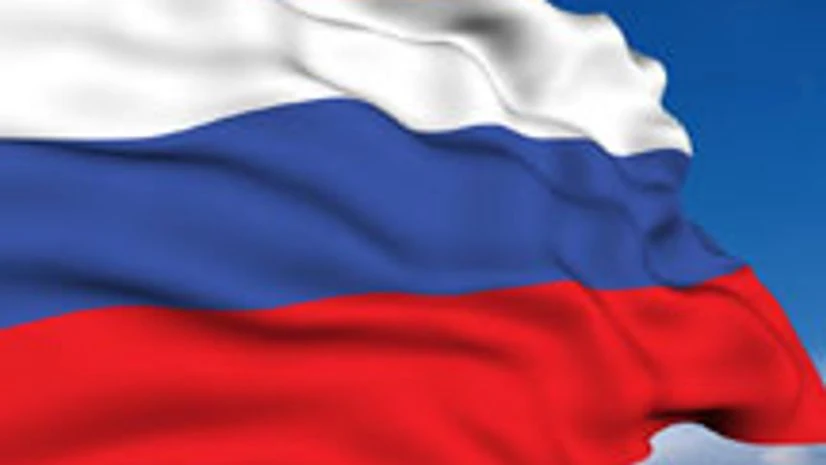Russia's credit rating was cut to below investment grade by Moody's Investors Service, which joined Standard & Poor's in ranking the country's debt as junk, citing the conflict in Ukraine and plunging oil prices.
The rating company downgraded Russia one step to Ba1, the highest non-investment level and in line with countries including Hungary and Portugal. Moody's has a negative rating outlook on the country, according to a report released Friday. Standard & Poor's decision cut the country to speculative grade in January.
"The existing and potential future international sanctions, the erosion of the country's foreign exchange buffers and persistently lower oil prices plus high and rising inflation will take a negative toll on incomes as well as business and consumer confidence," Moody's said in the report. "While the fall in the oil price and the exchange rate have reversed somewhat since the start of the year, the impact on inflation, confidence and growth is likely to be sustained."
More From This Section
'Forced selling'
Downgrades to junk from at least two rating companies may force money managers whose investment guidelines prohibit them from holding debt rated below investment grade to sell as much as $5.8 billion of Russian dollar and local bonds, according to a January report from JPMorgan Chase & Co.
"Most bond funds, which have rules against investing in non-investment-grade securities, will have to sell bonds regardless of whether they want to do that or not", Slava Smolyaninov, a strategist at UralSib Capital in Moscow, said by phone Saturday. "Investors will re-evaluate Russia and regard it as more risky. As a result, risk premiums will be higher."
Non-residents held 877 billion roubles ($14.1 billion) of Russia's local-currency bonds known as OFZs as of December 1, or 24.2 per cent of the total, according to the latest figures available from the central bank. That's down from a peak of 28.1 per cent on May 1, 2013, though up from just 3.7 per cent at the start of 2012.
'Beyond reason'
The decision by Moody's ignores information provided by Russia's finance ministry about the economy as well as the country's fiscal and financial policies, Finance Minister Anton Siluanov said in an e-mailed statement after the report.
"The decision by Moody's isn't just negative beyond all reason, but it's based on an extremely pessimistic outlook," Siluanov said. "The agency was guided primarily by political factors when deciding to cut the rating."
Moody's estimates capital outflow from Russia will reach $400 billion in 2015-2016, while the economy will shrink 8.5 per cent during that period, Siluanov said. The figures weren't included in the rating company's statement.
Russia's Economy Ministry predicts gross domestic product will contract 3 per cent with capital outflow at $115 billion this year, according to its forecast submitted to the government this month. GDP fell 1.5 per cent in January from a year earlier, according to the ministry's preliminary estimates.
'Short-term consequences'
Alexei Kudrin, who oversaw the country's finances when Russia earned an investment-grade rating in the mid-2000s, said the timing of the cut to junk was hard to explain, according to a post on his Twitter account.
The Finance Ministry doesn't expect the decision by Moody's to have an "additional serious impact on capital markets," it said. The share of non-resident holders of OFZs won't decline significantly, according to the ministry's estimates.
"There won't be short-term consequences as everybody was expecting the downgrade and those who wanted to sell securities, already did," Anton Tabakh, chief economist at RusRating, a Russian credit rating company, said by phone Saturday. "Of course, the rating cut is bad for companies, for banks that are still alive. In general, there is nothing good in a downgrade."
Borrowing Costs
The yield on Russia's $3 billion of dollar bonds due 2023 has surged 1.72 percentage points over the past year to 6.4 percent. The rouble has plunged 42 percent to 62.05 per dollar in the span, the worst performance among 31 major currencies tracked by Bloomberg.
Investors often disregard ratings companies' credit grade and outlook changes. France's 10-year yield, which was 3.08 percent when S&P removed its top rating in January 2012, tumbled to a record-low 1.112 percent on Oct. 15 last year, from 3.04 percent.
"The financial markets in Russia are inherently volatile as long as there is uncertainty about the direction of oil prices and as long as the military conflict continues," Kristin Lindow, senior vice president in the sovereign risk group at Moody's, said by phone from New York on Friday. "We don't see a logical end to the sanctions in view of the fact that the ceasefire such as what was negotiated last week has not been complete."
With continued fighting pushing a cease-fire sealed last week to the brink of collapse, European Union President Donald Tusk threatened Friday to impose tougher sanctions.
At a meeting of Russia's Security Council in Moscow on Friday focused on the conflict in Ukraine, participants also discussed matters related to the domestic economy, the Kremlin said in a statement.

)
